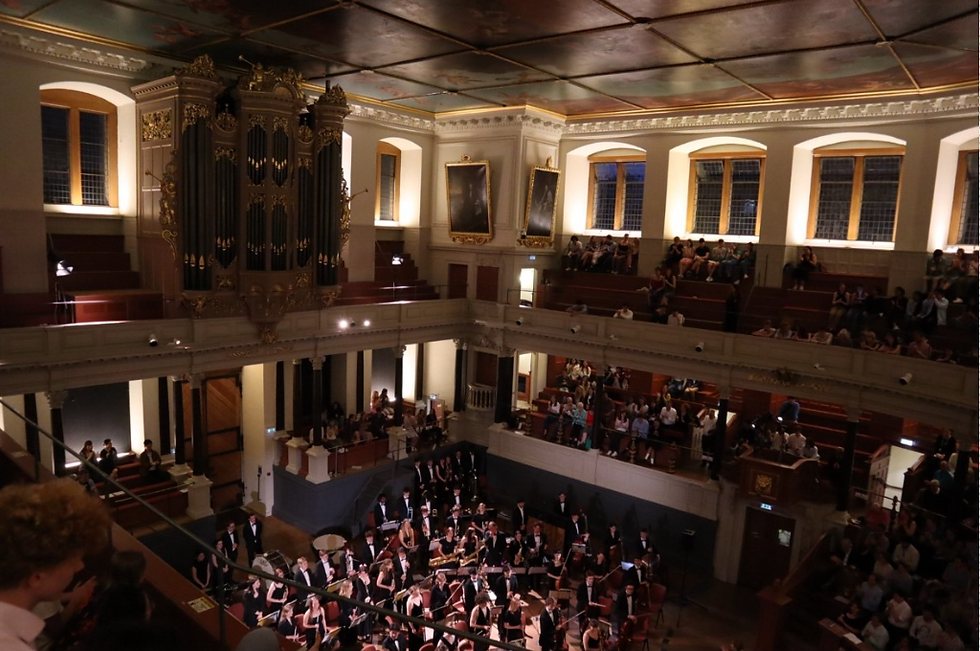THRILLINGLY DIGESTIBLE: OUPHIL HT23
- Cameron Hutchinson

- Mar 3, 2023
- 3 min read
OUPhil’s Hilary Term Concert on Wednesday 1st March promised ‘a night at the opera’, and without a doubt, their programme gave the audience exactly that. The evening spanned a range of operatic styles, and it was particularly satisfying to see the concert start with the more idiosyncratic works of Boulanger and Busoni before transitioning into the more familiar sound worlds of Puccini and Strauss, culminating with Wagner’s classic Prelude and Liebestod from 'Tristan und Isolde'. Most noticeable was the impressively consistent precision of the orchestra throughout.
Lilli Boulanger’s D’un matin de printemps made for a thrilling start. The piece is characterised by its lively and spritely energy in combination with rapid and unexpected harmonic shifts, and it certainly kept the audience on their toes. Especially captivating was the opportunity this piece provided the principal viola, violin II, and violin I players (Joe Barber, Michael Fu, and Gabriele Brasaite respectively) to seamlessly pass around a distinctly rhythmic solo; it highlighted how tightly bound the section was as a whole.
Busoni's Rondò arlecchinesco followed on cohesively from Boulanger’s work; her piece made way for the more chaotic compositional style of Ferruccio Busoni. This piece illustrated the whole orchestra's consistent ability to pass around rhythmic motifs between sections and individual players. Particularly impressive was the dynamic control that the brass displayed, with blaring horns suddenly being replaced by the faint sound of muted trumpets. The emergence of the voices (Simon Ashmead, tenor and Daria Papysheva, soprano) from the height of the Sheldonian’s Upper Gallery provided the audience with a sense of the opera’s drama, albeit in a compact and digestible ten-minute performance.
Before the interval, OUPhil returned to the more familiar work by Giacomo Puccini – a selection of arias from La Bohème. The contrast was fantastic, with the rhythmic precision of the previous pieces being replaced by the rich sound of strings using plentiful amounts of bow. At climactic moments, the dynamic balance was lost, with the tenor soloist unfortunately becoming overpowered. However, this was less of an issue with the soprano, and in other areas of the orchestra, dynamic balance was phenomenal. Notably, the harp was given ample space to play out and the woodwind displayed great delicacy in the blending of their sound when playing as a section.
Richard Strauss' Morgen! provided a much-needed respite from the intensity of the music that had come before it, and its placement in the order of the programme maximised the audience’s ability to appreciate that. Wagner's Prelude and Liebestod concluded the concert, and the focus fell back onto the orchestra. The opening moments of the Prelude felt a degree too restrained in the orchestra’s use of rubato and thus the tension felt in the 'Tristan' chord could have been greater. Perhaps this was owing to the fact that the Strauss was not scored for the entire orchestra, with some time needed for players to warm up once more after their break... Before long, however, and especially during the Liebestod section, the tension and anguish in the music came through convincingly. A particular highlight was to watch the timpani display the utmost control and precision in dynamics.
OUPhil most definitely provided us with 'a night at the opera' - but one in which the interest was not solely on the singers and the storyline (as is often the case with opera). Instead, the attention was shared with the orchestra itself, giving us a holistic experience. In doing so, we could see the high quality of the orchestra, brought out by conductor Marcello Palazzo.







Comments